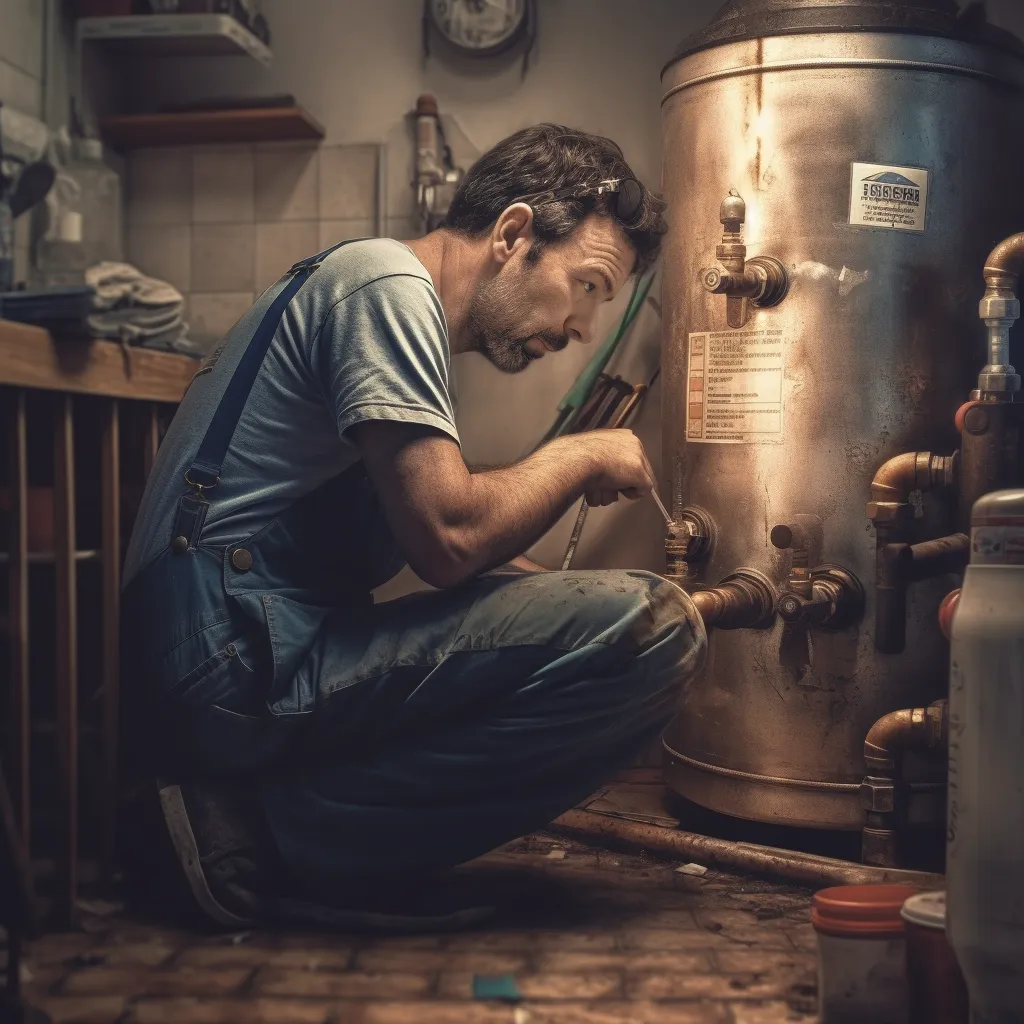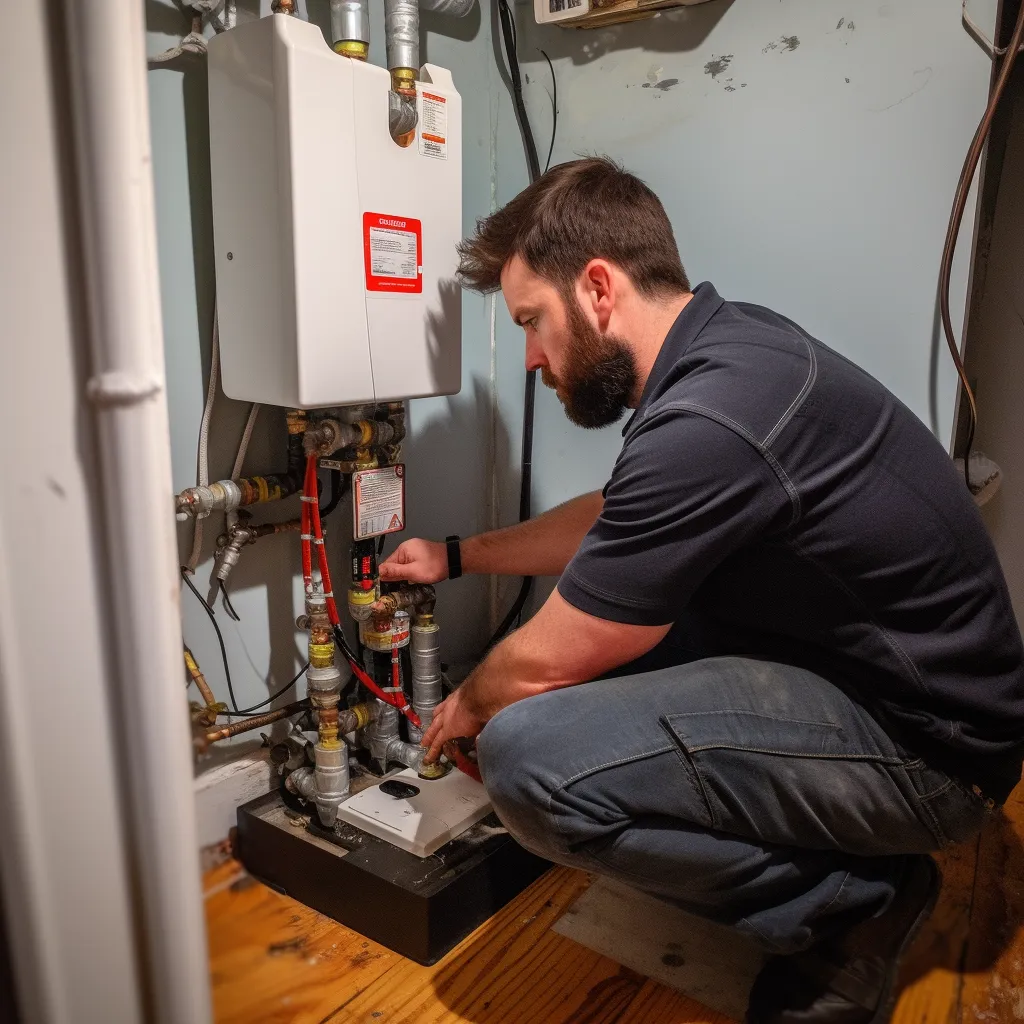Is it Better to Repair or Replace a Water Heater?
When it comes to water heaters, homeowners face a crucial decision: should they repair or replace? While repairing may offer quick fixes, it might not be a lasting solution like the benefits of replacement. To make an informed choice, homeowners should consider factors like the water heater's age, condition, repair frequency, energy efficiency, cost-effectiveness, and potential savings. By carefully assessing these factors, homeowners can decide whether repairing or replacing their water heater is the right move for their needs and budget.

Determine the type of water heater you have
In order to keep your water heater in good condition and fix any problems that may arise, it is important to know what type of water heater you have. There are a few different types, including tankless, storage tank, and heat pump heaters, each with their own unique characteristics. Tankless heaters are smaller and use less energy, but they can be more expensive. Storage tank heaters are more affordable, but they take up more space. Heat pump heaters are environmentally friendly, but they require specific installation conditions. Having knowledge of your water heater's type will help you make informed decisions about maintenance, repairs, and upgrades, ultimately saving resources and improving efficiency.

Consider how old your water heater is
It's smart to check the age of your water heater and replace it if it's over 10 years old. Older heaters may not work as well and could break down more often, which can be expensive to fix. By getting a new water heater, you can save money and have reliable hot water for your family. Don't wait for a surprise loss of hot water. Start looking for a new water heater now and enjoy the benefits of newer technology.

Regularly check your water heater's condition
Homeowners should regularly check their water heaters for any potential problems. Keep an eye out for the following warning signs:
If your water heater is getting old or reaching the end of its expected lifespan, it might be a good idea to start thinking about getting a new one.
If you notice that the water coming out of your faucets is a rusty color, it is possible that there is corrosion occurring inside your water heater tank. This corrosion could potentially cause leaks or other issues.
If you notice any water pooling or leaks around the base of your water heater, it's important to take immediate action.
Addressing these signs promptly can help prevent additional damage from occurring.
If you're having trouble with water temperature or a reliable supply of hot water, it's probably a good idea to get your water heater checked out.
If you spot any of these signs, it's best to reach out to a professional plumber or water heater specialist. They can evaluate the problem and offer suitable solutions.
Analyze the cost of repairing your water heater compared to replacing
If your water heater is old and not working properly, you may think that repairing it is the cheaper option. However, replacing the water heater might actually be more cost-effective in the long run. A new water heater can last up to 15 years and can help you save on your energy bills. On the other hand, if your water heater is relatively new and working well, it might be more economical to simply repair it. To make the best choice, you should do some research and consider factors like the age of the unit, the extent of the problem, and the cost of repairs compared to the cost of a new water heater. It can also be helpful to consult with a professional for their advice and guidance.
Analyze energy efficiency gains if you replace your water heater
Upgrading to a modern and efficient water heater can save you a lot of energy. It's been found that water heating uses around 18% of a household's total energy. By switching to a newer model, you can cut down your energy bills by as much as half. Not only that, but you'll also get a more reliable and effective performance. Choosing an energy-efficient water heater is a clever move to save money on energy and help the environment.

Is it time to upgrade to a larger capacity water heater for your home?
Upgrading to a water heater with a bigger capacity can address the issue of running out of hot water while showering. This upgrade ensures a continuous supply of hot water, offering advantages such as:
With our water heaters, you can enjoy longer showers and use other appliances at the same time without running out of hot water.
By minimizing heating cycles, this water heater helps reduce energy consumption.
One of the key advantages of investing in a water heater is the long-term savings it brings on energy bills.
Choosing a water heater with a larger capacity is a wise choice for the long run. It helps in cutting down energy costs and guarantees a steady flow of hot water for a longer duration.

Research rebates or incentives
When buying a new water heater, it's important to consider government incentives and rebates. These programs can help reduce costs. Look into local or state improvement programs that provide financial assistance for upgrades. Contact your utility company or local building department for information on potential incentives for energy-efficient water heaters. Making use of these programs and incentives can lead to substantial savings on your new water heater.
Consider the warranty if replacing water heater
When deciding whether to repair or replace your water heater, considering the warranties is crucial. The warranty for repairs is usually shorter, while manufacturers often offer longer warranties for new water heaters, sometimes lasting up to ten years. Taking these warranties into consideration will safeguard your investment and give you peace of mind for the future.
Research if water heater repairs are covered by homeowner's insurance
Many homeowners wonder if their home insurance policies cover water heater repairs. The good news is that most policies do cover water heaters and other household items. However, it is important to carefully read your policy to know what is included and what is not. Understanding your coverage can save you from unexpected repair costs.
Research local plumbing companies that can fix and replace water heaters
If you're in need of a plumber to install, maintain, or repair your water heater, it's important to find licensed and certified professionals who have experience in this area. Look for experts who are known for their skill and expertise in water heater services. It's also a good idea to compare rates from different professionals to make sure you're getting a competitive price. Reading customer reviews can help you determine the quality of service they provide. When choosing a professional, opt for someone who offers fair pricing and warranties for both parts and labor.

Seek advice from a licensed plumber to determine your best water heater option
It's important to consult with a licensed plumber when selecting a new water heater. They have the expertise to evaluate your hot water needs and suggest the best option based on factors like size and cost-efficiency. By getting guidance from a licensed plumber, you can make a knowledgeable choice and ensure your home has efficient hot water.
What are the benefits of hiring a water heater professional near me?
Water heater problems can be a real headache, but hiring a professional technician can save the day. If you're experiencing issues with your water heater, don't hesitate to contact a specialist. Their knowledge and skill will guarantee that your water heater is repaired quickly and efficiently. Here are a few benefits of turning to a water heater specialist:

Research is crucial before deciding whether to repair or replace
When homeowners need to repair or replace their water heater, they should consider several factors. These factors include the age and type of the water heater, comparing the cost of repairs to the cost of a replacement, checking for energy-efficient features in new equipment, reviewing insurance coverage, researching licensed specialists, local rebates, and warranties, and consulting with a professional plumber for expert advice. Considering these factors will help homeowners make informed decisions about their water heater needs.

Contact Us
